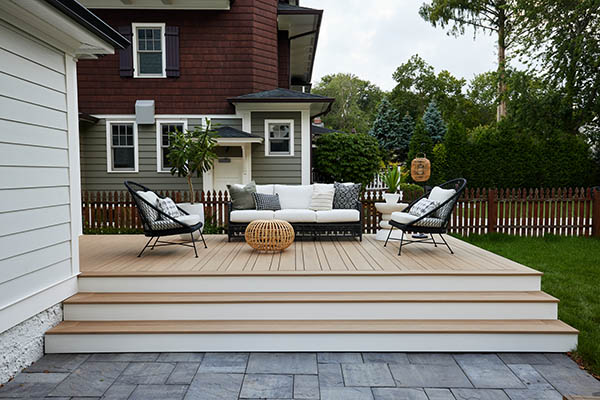Hiring an qualified deck installer Austin is the first step toward creating your ideal outdoor space.
Hiring an qualified deck installer Austin is the first step toward creating your ideal outdoor space.
Blog Article
Exactly how to Choose the Right Materials for Your Deck Installation Task
Choosing the ideal products for your deck installment project can seem complicated. There are many aspects to take into consideration, from resilience and maintenance to aesthetics and ecological impact. The option in between conventional wood and composite products, each with its very own collection of advantages and downsides, can be particularly tough. The trick is to balance your budget, style preferences, and lifestyle needs to create a deck that will enhance your outdoor room for many years to find.
Comprehending the Different Kinds Of Deck Materials
When beginning on a deck installment task, the choice of materials ends up being a crucial choice. Composite materials, on the other hand, are a blend of wood and plastic, giving toughness and resistance to weather elements. By comprehending these distinctions, home owners can make a more informed decision on the most ideal deck product for their particular needs.
Reviewing the Toughness and Upkeep Requirements of Deck Materials
Assessing the longevity and upkeep needs of deck products is a crucial action in deck setup. Durability involves the material's capacity to withstand severe climate condition, damage, and its long life. As an example, cedar and redwood are normally immune to rot and pests, making them long lasting choices. On the various other hand, pressure-treated timber, while resilient, may need more upkeep due to its vulnerability to splitting and contorting.
Recognizing maintenance needs is equally essential. Some products require routine sealing or staining to keep their appearance and stand up to wetness damage, while others, like composite outdoor decking, demand much less upkeep. By evaluating these variables, one can select one of the most suitable outdoor decking material, ensuring an equilibrium between toughness, maintenance demands, and visual allure.
Expense Evaluation: Comparing Timber and Composite Decking
Although price may originally seem like a second worry, it is a considerable factor when contrasting wood and composite outdoor decking. Wood, normally a cheaper option, has a lower upfront expense. Over time, upkeep expenses can build up, possibly making timber extra expensive in the lengthy run. These upkeep costs might include staining, securing, or changing harmed boards. On the other hand, composite decking, while pricier at first, requires less upkeep, possibly reducing lasting costs. It's important to keep in mind that composite outdoor decking isn't resistant to put on and tear, and substitute prices can be high. Prospective deck owners need to consider their spending plan and readiness to keep their decks when determining in between timber and composite outdoor decking.
Aesthetics and Style Versatility of Decking Products
While expense is a crucial consideration, the visual appeal and design flexibility of decking products also play a considerable role in the decision-making procedure. Different materials use differing levels of visual charm. As an example, all-natural timber decking provides a traditional, timeless appearance, while composite materials provide a large range of colors and appearances to suit diverse tastes and designs. In a similar way, design adaptability refers to the ability to form and adjust the outdoor decking product to fulfill specific style demands. Wood, for circumstances, offers high style flexibility because of its simplicity of cutting and forming. Compound materials, while less versatile in style, are still adaptable sufficient for a lot of deck layouts. These factors, consequently, are vital factors in the selection of decking product.
Ecological Effect of Decking Materials
When choosing decking materials, one need to think about not just aesthetic appeals and resilience, but additionally the environmental effect. It is essential to assess the sustainability of materials and check out recycled outdoor decking options. Understanding the prospective effect on regional ecological communities will certainly make certain an extra ecologically accountable choice.
Analyzing Product Sustainability
In the world of deck building and construction, assessing product sustainability is a crucial action. Composite outdoor decking materials commonly combine wood and plastic, lowering the demand for brand-new timber but boosting dependence on fossil fuels - deck installer austin. Thus, the selection of outdoor decking materials must stabilize performance, appearances, price, and sustainability to guarantee an accountable and lasting installation.
Recycled Decking Choices

Compound outdoor decking is particularly prominent as a result of its durability and simplicity of maintenance. It's resistant to rot, pests, and fading, making it a long-lasting option. Recycled plastic decking, on the other hand, is highly durable and needs marginal maintenance. While these products might lug a higher preliminary look at here cost, their long life and minimized environmental impact make them a wise investment for the eco-conscious browse this site house owner.

Impact on Local Ecological Communities
While the advantages of making use of recycled materials for decking can not be overstated, it's equally crucial to take into consideration the broader environmental ramifications of these choices. The extraction, handling, and transport of products can exceptionally affect regional ecosystems. Logging for lumber outdoor decking adds to environment loss and climate change. Even the manufacturing of composite products can launch unsafe discharges. On the other hand, utilizing recycled or sustainably sourced materials can assist mitigate these results. Furthermore, taking into consideration the life expectancy of products can reduce ecological effect; longer-lasting options require less constant replacement, therefore preserving sources. Correct disposal of old decking is crucial to lessening land fill waste. Basically, an eco-conscious deck job demands careful product option, sustainable sourcing, and accountable disposal.
Making Your Decision: Tips for Choosing the Best Deck Products
As the write-up shifts into the subtopic of "Making Your Last Choice: Tips for Selecting the Ideal Deck Materials", it is essential to recognize the selection of deck materials offered. Striking an equilibrium in between durability and aesthetic appeal is necessary in this option process. The adhering to discussion will guide viewers in making an educated option based on these essential considerations.
Comprehending Different Deck Materials
The task of choosing the best materials for your deck installment can seem discouraging due to the vast selection of alternatives offered. Vinyl or PVC decks are even much more resilient and call for much less upkeep than composite materials, yet they can look less natural. Light weight aluminum decks are solid, lightweight, and resistant to rot, however they are also the most pricey option.
Toughness vs. Visual Appeals Balance
Stabilizing durability with aesthetic appeals can be an obstacle when choosing deck materials. The choice often comes down to personal choices and the deck's planned use. High-traffic areas may necessitate sturdy materials like composite outdoor decking, which stands up to deterioration but may check my source lack the natural beauty of wood. On the various other hand, timber provides a timeless charm and warmth that artificial materials struggle to replicate. However, it needs more upkeep and may not last as long. Therefore, home owners need to strike a balance, considering both the deck's functional demands and their aesthetic choices. By doing so, they can ensure their deck stays a practical and eye-catching outside area for years to come.
Verdict
In final thought, picking the appropriate products for your deck installation task calls for cautious consideration of factors such as resilience, maintenance, expense, looks, and environmental influence. Whether you go with standard timber or composite products, your selection should align with your spending plan, style preferences, and way of living. Inevitably, the most effective decking material is one that boosts your outside space and gives enjoyment for many years to come.
Report this page